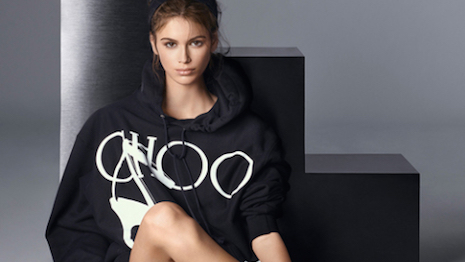When it comes to mergers and acquisitions in the luxury business, many companies are consolidating and expanding into new markets and sectors to better cater to diversifying interests.
According to a new report from Baker McKenzie, Michael Kors’ Versace takeover, Richemont’s move for complete Yoox Net-A-Porter Group control and LVMH’s Belmond buy show that luxury brands are diversifying their holdings into new markets and territories. As consumers’ interests continue to grow, these marketers are hoping to ensure a bright future where they can cater to all, while maintaining their prestigious images.
“To remain competitive, retailers need to get a better grasp on what makes shoppers tick,” said Alyssa Auberger, chair of Baker McKenzie’s consumer goods and retail group. “The increased consumer desire for personalization – whether around a product or an experience – is one aspect brands need to be sensitive to, as is the desire to share values with a brand – to trust a product and feel a connection, and those are both likely to be drivers in M&A in the sector.”
M&A in luxury
The luxury business is consolidating, with so many mergers taking place that fewer companies are controlling the industry.
But the big heritage companies will have to continue strengthening their experiential and personalization undertakings, as small startups and other businesses figure out how to bring luxury to the masses.
Baker McKenzie notes that M&A activity in consumer goods and retail jumped 25 percent from 2017 to 2018, but the firm's Global Transitions Forecast predicts it will drop from $700 billion in 2018 to $629 billion this year. This decrease will still remain ahead of other sectors, such as finance, tech and healthcare.
In the report, Ms. McKenzie reports that consumers are hungrier than ever for personalization and need to feel connected.
Luxury groups are more durable to outside factors than other sectors, but they are also broadening themselves.
For instance, LVMH Moët Hennessy Louis Vuitton is expanding its hospitality portfolio with the acquisition of hotel group Belmond.

The Belmond Orient Express, now controlled by LVMH. Image credit: Belmond
Founded more than 40 years ago, Belmond encompasses 46 travel experiences, including hotels, trains and river cruises. As luxury becomes more about experiences than ownership of physical goods, LVMH’s move will help it capture more of the growing high-end travel business (see story).
With the Versace acquisition, Michael Kors took control of the label and afterwards changed its parent company name to Capri Holdings Limited, in a move to strengthen its luxury offerings and rival companies such as LVMH, Richemont and Kering.
 Jimmy Choo is another brand in the Capri family. Image credit: Capri
Jimmy Choo is another brand in the Capri family. Image credit: Capri
Richemont took control over Yoox Net-A-Porter, buying out the remaining shares the luxury conglomerate did not previously own in an effort to maintain jurisdiction over the online retailer.
United States IPO
In the United States, public offerings are becoming more popular even though there is political and economical uncertainty.
While a federal shutdown has taken place and the country is undergoing a trade crisis with one of luxury’s biggest markets, China, many American brands are still looking into IPOs.
For instance, luxury consignment platform The RealReal is rumored to be looking into a possible plan to go public.
According to a report from Reuters, someone close to the situation claims that The RealReal Inc. has been meeting with banks to work on an initial public offering. The IPO would follow widespread growth from The RealReal, as it recently dropped its first global campaign and succeeded in a positive round of funding last year (see story).
"America’s IPO momentum is building, despite an uncertain forecast around GDP growth in light of moves such as the recent federal shutdown," said Brian Chia, partner of M&A at Baker McKensie. "Broadly speaking, across Asia, access to growing and deepening markets, new geographical footprints, a younger consumer demographic and increasing income disposal all bode well for M&A.
"However, brands may become more selective and strategic in their choice of targets and be circumspect," he said.
{"ct":"wJ3CGJRo1BJwivnUbakd3UrYb8ehwwtcbP7AHEAQOwvsiLCRlgujzJtMi6cJAsmHf2+U55nql1ztfBPammkalnVdVNW1W+zoiaf+Nmi7fkBlSrRUKRA7OG37aY5IEA6cKiIkiO127gZot+mP9MZQ4ooGeAeZ4MZGiqghG6uQtcNcugkWyWgrx02cRoKYK6U\/2OVEC5z04t55qDQYgGdcefKfe74wx7CEQz4tg3xznnxPlg1tpiOnrJlwYoX7xq\/AZFJpxUh+197jV0gH03cmy\/CJwRFNRbYJg\/0Rw9DKxfK2l5YsJy2JnPLrooc5l7jdsuKE2YZ8TvrNmnkAMO9+krfbFdLbvH4qL+V6z91h1QYjxFO474yWM6ucuRlLChD7W8mP9hc9l4B1p1AzqpfGjOuhjQZxx7sv+J9x7gwJXhd0PEExXiZZPFcrCxviWgUjf+EmfTc1FY0G8VN+JYigi+Q\/A9N6iIZ\/9vU2QpoJLAaGLNMZ9qeGbowJlIjpfUht9H0xSaggXm\/Dibynmt+xs6T+rcPnPnBeI72cc64dVL7Am1Rw9GFH1+BzmzWArwZKfuusCLY3ETwqngfpeSapYQDZdFNG1sngIYSlqWW8lYtcw4Ny2HqHKplhDODOHCpbrz24\/W0wDSUYVUfx2C4Y9Cf\/9gf49DUPPb9rAb0yiM5JdYPxAdCMEItvFEQL7NRmPtuEM2JG4H1UXhhJi84fkb2LLlTMd0pPlTr0CvNmr15Zfz9u3RT6r5xrLIq824BuP5Sn+8+lOqyz1JdAiG2kfkvPpVZE3Kj9doF20HyJyRFNPYc9Px+9z4OfOSuG2835\/AClKi9AtAc+zQxXTgd66FWaI\/y5bSf237ofmNTE2LRLLfclNn7WP4guaPx6CzOPFc+utdZz3H0i9UnY08vUFQ1amnMzbrtB7qqxwPMmh6mVGmAsd9FkuUiK+xfT+zASeHR+CgaUXONKU2pR2U3LfGqB+oNUGXv2rWjgUY7QGmGp91zcLs+OuJK+dRirLbOFrj0F0gBoIh+BlHDAm0VaxE0jhBd0VY5p1IHF4mmwKKu3wFUmAVQbNv31wsYMZjRfJXHPHkJ6ETeUFCMsrVGTRBDhpOWr+Yn4UoWIg64df8eTSCiBvZD6kZIHRw5zegm7r\/eXQOE\/HJCwgXg5tPTlnKuTx9P4Jl6v6gucNYiX8geeGyFecZb+H+BlvB0kPq2cBe3LXsVJsEojC8VCzHH45s34wx6nQXXwT2GQR4Ld3nqNOG45R1APr3MWuzpA4tpvkQXjZNO1b8QRXRgCZACed0VjrAbHkZa4oRtyY\/Lolu1+4k8fggX\/\/Z1KQOXRKH5D\/R07rKCOwBP9a238f+GzCr6gAb8iBwsnrOh4THSHgxa1tXILdijlKBPCJ2VVDjlvZ8ph5fyiP6PQ43Tz2ARAHuJQhtf9CKi\/bXnyu8DUhY8gxwJXQzK7bKHdSN9IMkSFgsZHJsZly8SUaJFXflp6JUpgQPcO3VDqR0Jv0OoNzBju5nytMdEPJ8CNa7uuNUirEJhkZ2Jb0sAMOS6pAqEpupjbXvqqN4TB70VlJ3+8f2dggSC2vEShx2jW7do\/LKv8xQNy1WiKoSwrWx1HJKklUDA7hjWQ5+PTXwdw32xVKqkpkbe5d8cNVmL7Nx71240XhUf\/DTgx7PyBbkKIXCypFbiV6w6QgD8IH+YSS5P+yx62nAL+edvdmIFa5Ws6Xm292MYOTlds9pj+OZh72OLFQKEC966FxYsAjyvYfSX5Kb+OeKon+oPOv4vPwdFlvLwmp5Yt2ojA0pFeLLua+UbXuwer+o825ffq5tdOvXHK5dLs2ZKOnUATRNUYr8RgsaLmtoR9vK6WOJlvvx5cOCQPfLtHelp2cbmdJ2ByRDgBeuoGOJfyDKlP1CUvDDGg5INWsgZLsMnngbA5ZVSMeFUpJa+QtKKC75FgD8j6DLNPD\/ufj5BxNAl8+A4pWsgiAvTaVfYRfcv+PzEJsuTQhce5cIrBchv\/4Q7UzxuEoDFgnadK5UXOeYJcAhnVM\/M0+A3J7UVLZIVUgi74+JZug0RrDj+\/hsJDcgFwb2wYwvhGxCqAxwG3SXz5690E6z6npatGuX578zy3MLiwnqTueUQUBYKXHN9CLFY\/dJSP0PJRqZWUg9u27N9ArUZiueYafSqenS+fw77W\/eqALZPacQfhEXsmt9b729veEHFVwMAlRxbSKuZwASGp3MW1\/F\/TlGwyTlGPgZsirMylykkEeS\/NuhM3BaS87EzomnaSoYSkXPza657wOfcAHC8lL3ry8sIY0E48fZnGdQksHeDcxahlujg3HX1qFmnctYcwIJ2wnv3CsF3Mp8Zi39fHQJVX0jjxJ3tFUFIwTeFN48ACAcrYHckZXrABl1aLfiMic5ohoazRKbIHgm629d55iBVbF+1Y1ITp0LCON3dQNkZ3Csm\/o2yKjwO649dB4eGMQmaQcKeuPIqvZU5uahSo1plBfalXe9YkKUw5BiX4agxvs+AMgHvePhgkpYFzYvM5Zk7nWmuXBCI0HIcIDkb2uFHWkxtPz73YICGZ1HcLrCPIDkPExBHA+IHwhgmd5RmjRPlG\/Zl4EVAAkumvqM9M7C214YbV1Ye7IHoJDwUgWcZdCrMBG6vy2V7pDvyite7ikPjghg7OyDjrUaw65pbwBVWAWDVr6PquUVO7S6w1zlDM8lj0JUl3KQMo56W8lD7K10hK4f5Jz8LMSv3Hhw2hvG1MIcKsndSQodUS8YeA5IUqtVWUw2Jzl920YRLF5cGcPeMA8nSpF6Na0d0a2vm1hJMxKinbcWDoq9QiWJRm65M2k6mJhIYlG\/xcOjFfWOdmdQkEdU8Y3mIw+f3L6t9uiwqCAEHL0WV6loGSlBMeNktycZSrqiszhWpvpm4MaXzNW81PRKb6wyaqaaD3i+V9aSA9oJBShL0m6m72RhgSpFNL29no4P7BSF1YtGcUq0f39gqwmO41Umm+u4aaSe93hVYunnS8DG+ut+p+uQ2zTSh57HPF9B50n3iZptxq9huX0q0OI7TfZXjcA+g5hOX3dk4a1W0hQz+6ipjbq\/QLv\/iIDJ3d2srla12odkPK\/8nVGEAjJ2xUs326sMRR8NMZR7DOLjIxA5ryFDueFI6WQ90huXTAnOxOlZhZjnnRrB6var\/hxpZiyyMt8+IY59AVRg3LXIZTJ50g+As48dtXesEWzdYTz53SvvrpbMJqM957RdVfkel+bguKCPzfcWMosXB7iSryIfQLFWNzzlxcI+Fvl2cQpXyyTBeiIPQPQ6qlmeQVaoZ90ZxV+mDWaRHXq9UJCPce2JF+2sdWOoAv3ttHG6NX3nz0k8dTpefEW0Nu71Z+xcBhJmupC4RBGR1JFj8LimTt6cN5LKZE4GEktGosC3SF+QD6d2hASWAY+raxaNTh9XleEUuTAf1iJsNyTyrKyiRYIqbq3oFZWKoyvWzGJ0OvHCxjIJzPRbSUl5e39tE9HukSuMATiUxXFvIwLF3RJyw7h9sQPmkGb7a6YS2p1hx58e7gcWoH6L25\/qceVjIllS0JT+EpH3+KN6+HqgGLJoioZCYuqfdyS2YJe0rBEJPq8B\/YK9nG3IG0enkJNK5jfSgsWssYFVVl2RhswNkP\/9Cwf6ueMyU9DvLvt6ZaAZnzXVNcDDk4b8Mcq7JGErBzGjtIA4c007wUdVVoQWA1jiW0KY4pt0rc5ko+2X+uNQn1zKKLlyJ+XamI2b6shTy0uFm4PYi9KBanktyUxbdoT+0BV8JccH0LT3yW3tMFNM50qyEkjmt78eIUYShHALxSENi10Rf96e0LcDMn92iZ8\/S4G1zEIRUgmuOjQoLP9F161JK\/uW\/O0bCB6uTNFOMVb81H0SzzA85BEP7vE4fSqOhKgZ0cYG1epJdHolfVQNB9rHP9aPP01jgJZ6IZxebWmiEmAfdFtLJ+kP6gP2xRQYNK9XQ7\/Q8n2hPbsDYsF9FZf2kbg6SwnsaLp64V6QWCbphi10QuXdm3U5mMuliDC3lpOvvBsEBw6ndsvoA2NSaZcHd1B8wwrY73KRM0fYgKHj6TZkiaZPPLpo6bn1cEckhHxqYf1PNlq1cVa+MEud3uhS\/0532I1J+fpb66zrAytKVP+Sn0E6dvAHVtTE38zUX3AcQQgjlKERKHXNCN46vpWtj8dpE1a8by0SU3yEoMZkH3Njiqso6lUwjF592Mu6tbdEIVuoKukl6uN7HC6rJ7aWsqD\/xJr4yYyGFIqiVNs7StIaYInEMIHN6PR4AqGRSa3SozywhZ3xDRrvjZo0a8GzWdnPWqfGW981ecUtODaoRpCqixrI+t99U85aP2IgcBGFWtR7cVF5bx4rHrsQcUTIGD3v6Zdn+GsQKZp6kYNBKc3Hjo7sjuBHoW27VjvnEysrpUCJZjxoWggaUqkM6qx+p0iWkUlzQGa4nunam55Dsyyd3PbLY0710S67GNu\/FM8qDPlret3au+nMPJNw8EvNHBRe3uNguyKBAnSoe45q+SKMJQSBUgQrR1U1j+0lwbtUVTP3d5PIDtTBLBftkCL5dKNXZ8fvgpHA+oFbK0J5Ioz6TcGb+RBrhljQrGgxG0dTH8qiPJhMuE46r2NQJVlEFirE3t0iy\/CRxkPMm3tWy6Z2KJm0WG5ZyJWjrp3JbPK\/fQkBM3cdUvrYtmFvovD1WDC4CQL6CXUeTBHLuwjoO79ZagwMxiWWHmr54P0j2ZAu2cbGVt10OAFvUj4A5XvF6ufh42AlSQGMZntt3sVDFmuAozjZqyYB21G6rTv\/080fgghIu5vBQzxzsxjTpmMhaZFuxTaSxNsegRs1MtaviDd59dVyXCzKfz\/7\/UVbnqlo6N3vx+23RAdiVrDyrBZJH1ybuA8EV0uD3a5DgIAQO0A8GTCDM2N5HKZyl26RJwNWx82uwoV2oQxgdpI2yju+KBEZyt0nWPwSm5NjdAPKyGWDlWM9RTVqU8V+H75HMhmLTtV1Eqgq8Z+j\/nocRB2WH3h7NZqK4zT9lZeLg\/ofcQfK0c5wz+Df0f5mlR+3iUXU3ySn1D99txEc8QSKKxNaBt3ELvr8BUZXy+\/0Skzo+yngb5PAKTFnJpNL7qeoCi\/4DQYTGsZ8clSsiT7SKpV1NmnlnM1wpXu\/indfOfN0tRHjH6V3hvM65RgsDlfPszPIN2k2tgB\/2u8ILCLT5O9gf9Gfy7KxFV\/93zeyMTuK5B\/t4jJNxHZUx\/TeTtIkzIdW+t\/oOatk\/HhNZOu5GZNY4sNb3cuh2+GrN+qzlro3aT0qkExVLYiEur3YsGvmxlSYKKoGroLuJ+0+BvycxYElZUrAbtpC2O5CzXiG\/JNhiuGEwqvAXu3taOddLcSLgKnytgwB7x14dN6kdK2uqugoI+WUW2iLktecFTl\/\/v5HqIhDSfNsEhZCOJKntX08UNugCKNejOVIPzuC\/djW1ClxFY3jsWpsPazF3kRuRzSOrEnn8o70+asBuLwtuL0z2\/eTSa3rJrAJXrxh+8lM84EnI1PHEjsjgEk96vui19pa8pYJ7ldN8ZLeJtE7pRl+NjbQQ+FcMBKiK2yiCeNdXVYT\/rlw8rTNM+q3HrvCYUvkH\/9BS9NGaBwhRUF3HnKH8ZxFz1h6BZYDJh8PiBPP65XqV16QRrxqLyRTol49spHpEwnzySVdZL4R7KUxtOkrUdS0uo612K2Wz5SkJj7GULAHPhjl4lEBMzGbJoPMyBcKUVx42voeErL6HGFBxgj8ugt1FWJcpt7TwAn3Hk0r+WC9hOVUDwAIUgaT5j43JnEyku3iPiKEcMiOWQL\/B2mxKd0P09jxeCjGYqkUgnwTEh1F2GXntgvPrmyXGYviViC1MdA2zn3YK7DBDqEasOgrOQApfjrivlz3ymSh5PcObDfmm8ww6epUoClm0LDld+vLZc7x8gHjoM4gunIjweyShcS9nUE2FUd2s6i4ArUVezpJ4nGVDAuyluOyb6AYStMid\/Yv69s48spihyrXfoozuW6Hw0IHdqOZ012EATAb9Nlm+9r\/PIb0sctYdrZAsERs6DOewYl\/RRdwYp36glhGqJ1E6Jm4NW+s6qFHeOfj7fuTq4hp9sQut2XemDv4mC7uzwTVaPqCwlJBMAeyiuyN5LI3X9t8ow2BUbIReko+JB5rZJO8frc58kR4MUXW3+8tkthEJ\/SbZK1QFgwGP7sUbzp4tI5lmHaVUYGwgEiV5tvipX2a7xyM+L09dAW8CMhnxbgMsNwDGnOG5yy7I7dxG6rMQcw4OT6WPxhk8\/y34aWgudVdBt7kjCs3wy6kQ6MdSDTlgQZc+3MDxq\/tbMYtJiKZ1tOtHJZqzS4Ap2Hcxc3YTldJyDIO75VLe1MayQi1SaMUsvOCdN2Ftgzovsrsbiex4EYl768M3RfcF6OexMS7or6lcrpubJvdOrfrPfXCAanHlPWy2OdZ4aYs8Yu8ZKBBvtOvuHxG8iHjvHzSDLphGgYoNj9tOIB8Wp5r5JmqkhjTBPec+rxbwYMKmOGgTTW35Opl0oPGw4nfXVhBL6zfNgHlQlSM3wz\/\/Z4zzYXKL7OgNvrsTvwz0xGMwYLs8k01EgnDBwLz79J3IVRW82l0qtMzMnPcHGYHRvFQkYjz5+g5Ntte9Kq0tSxOlxdQD1onyLQz5GCQEmpyd7j+9zUaMuvVILTMSBdivCD9DlpaTXXXIDKTnw8rzGFUtP\/B7PJM57JEg8Tuoe3BKA05K\/nWPldFgNOSJUW7Uv50t1NIoALMplFrFV\/m2fC1VwbGR+YxLGLQbdaHcWa1qyCi6K\/vH1gWP12J3ThN6JQ7XVnhqB5\/th0YltTGY2XgMNTYTeENY7h\/98vO9pPNAkUPvnEXCr5Or1n3ntYdVAYhcoIGT+pk1bsyVmGfrP1Jh2gnDm4SgRH\/SFe6AnGWCCu+l6Vzj1awzdwx8OQylYRMPWNiWIiWzG4qefA0PV9T5G9mAKYM5R+rOgnSzWE+WRCav71i3tPs\/vPfw8uiWDJ6w16e2T4IYY\/wKijHoSM1IBDjiOFYl1GtZEBKJDeBNDNYw0OVVu229sEPwz3U0vfeXw7tBUMAkaTLPtt2A74Fyq2AM7H5r0EasiqqgXDhdxifnvZLNsG5iZ31rilmKcLI1CwwZIn2jQUgV+kwMkD2fmVIF\/A592bdC2InNZzeU80eqQapp7lCsfPvYr+dc+Xq316\/GKfHrUguKQX1f3kTSW1W0Q09ZHMp4HQAkM\/rRZb0dt\/2srVBVA6IIaks9tY+zeFb6TwM2xbhIoy+GcJ\/3I4EYNln0SpYOkeHHZ025lNGt\/Flh3BD5n4bH7bBDzJMJOjq68cXvSMyIuKzRdZIrY\/2GrHhb+dIqTVahasWsDgzlHQSC\/knDUcVB8sbeD5fqVgU9Ra4NIhyh3Mjc7fPYSx1Xg","iv":"f9f6126e4d5fb88fa8836b625e43a37c","s":"e352af21d1878bf2"}

 Jonathan Akeroyd, Donatella Versace, John D. Idol celebrate acquisition. Image credit: Michael Kors/Rahi Rezvani
Jonathan Akeroyd, Donatella Versace, John D. Idol celebrate acquisition. Image credit: Michael Kors/Rahi Rezvani
 Jimmy Choo is another brand in the Capri family. Image credit: Capri
Jimmy Choo is another brand in the Capri family. Image credit: Capri